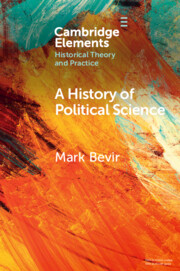Element contents
A History of Political Science
Published online by Cambridge University Press: 04 August 2022
Summary
Keywords
- Type
- Element
- Information
- Online ISBN: 9781009043458Publisher: Cambridge University PressPrint publication: 11 August 2022
Bibliography
- 14
- Cited by

